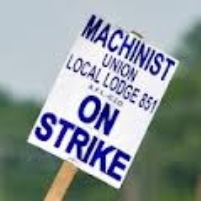Booming Caterpillar Rewards CEO While It Punishes Workers
Monday, July 30, 2012

Just a few months after closing a manufacturing plant in London, Ontario, in order to transfer its work to a site in Indiana where workers would work for lower wages, heavy equipment manufacturer Caterpillar, Inc., is demanding that workers at its Joliet, Illinois, plant accept a six-year freeze on wages and pensions. The company is also asking employees to pay more for health insurance coverage, contending that it needs to stay competitive in the global market. The nearly 800 workers have so far rejected the company’s demands and have been on strike since May.
The company’s claims are difficult to reconcile with Caterpillar’s recent stellar performance: a record $4.9 billion profit last year, $3.2 billion in profits in the first half of 2012 alone, and handsome quarterly dividends to shareholders for years. In fact, the company’s most recent quarterly report vocally trumpets its profitability by announcing a “second-quarter 2012 profit per share of $2.54, an all-time quarterly record, and a 67-percent increase from second-quarter 2011 profit per share of $1.52. Sales and revenues were $17.374 billion, also an all-time record, and a 22-percent increase from second-quarter 2011 sales and revenues of $14.230 billion. Profit was $1.699 billion in the quarter, an increase of 67 percent from $1.015 billion in the second quarter of 2011.”
Reflecting these successes, Caterpillar has shared its profits with management by raising their pay substantially over the past several years, and last year paid CEO Doug Oberhelman nearly $17 million, a pay raise of 60% over 2010. Nevertheless, although the company’s 2011 profits came to $39,000 per employee, Caterpillar has defended its decision not to share profits with workers by contending that many of them are paid above market rates. Given the company’s history as what Cornell University Industrial Relations professor Richard Hurd calls “a leader in the past 20 years in taking a hard line” against labor, Caterpillar’s decision may be driven more by management’s ideology than the company’s bottom line.
“A company that earned a record $4.9 billion in 2011 and $1.586 billion in the first quarter of this year should be willing to help the workers who made those profits for them,” argued Timothy O’Brien, president of Machinists Local Lodge 851. “Caterpillar believes in helping the very rich, but what they’re doing would help eliminate the middle class.” At present, with the Joliet workers on strike, Caterpillar has hired replacement workers, though the strikers believe that the scabs do not have the skills necessary to run the plant profitably in the long run.
-Matt Bewig
To Learn More:
Corporation Pushes Six-Year Pay Freeze on Workers While Making Record Profits, Paying CEO $17 Million (by Pat Garofalo, Today’s Workplace)
At Caterpillar, Pressing Labor While Business Booms (by Steven Greenhouse, New York Times)
Mega Manufacturer Caterpillar Demands Concessions from Workers after Boosting CEO Pay by 60 Percent (by Pat Garofalo, ThinkProgress)
Caterpillar Closes 62-Year-Old Plant in Canada to Take Advantage of Cheaper, Non-Union Labor in Indiana (by Noel Brinkerhoff and David Wallechinsky, AllGov)
- Top Stories
- Unusual News
- Where is the Money Going?
- Controversies
- U.S. and the World
- Appointments and Resignations
- Latest News
- Trump Goes on Renaming Frenzy
- Trump Deports JD Vance and His Wife
- Trump Offers to Return Alaska to Russia
- Musk and Trump Fire Members of Congress
- Trump Calls for Violent Street Demonstrations Against Himself






Comments